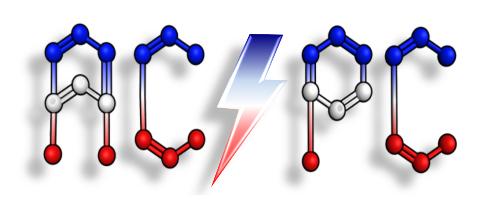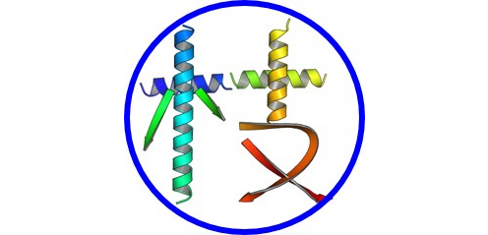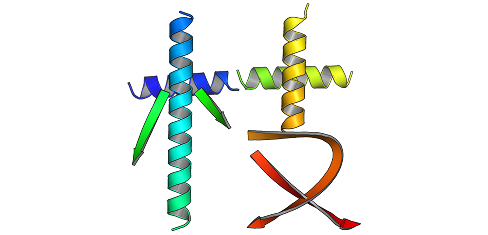Download links
Software produced within our team
We currently have a few open source software released to the public.
They are listed hereafter in reverse chronological order.
 ACPC is a ligand-based virtual screening tool
using AutoCorrelation of Partial Charges.
The version published in the Journal of Cheminformatics was ACPC version 1.1
(OPAM package acpc.1.1).
ACPC 1.1 was validated on this dataset.
ACPC is a ligand-based virtual screening tool
using AutoCorrelation of Partial Charges.
The version published in the Journal of Cheminformatics was ACPC version 1.1
(OPAM package acpc.1.1).
ACPC 1.1 was validated on this dataset.
The version shown on a poster at the Chemoinformatics Strasbourg Summer School 2014 and at JCUP V in Tokyo was ACPC 1.2 (OPAM package acpc.1.2). ACPC 1.2 was validated on this dataset. EleKit allows to measure the similarity of
electrostatic potentials between a docked small molecule
and a known ligand protein for the same receptor.
EleKit is intended to facilitate the design of SMPPIIs
(Small Molecule Protein-Protein Interaction Inhibitors).
The corresponding
article.
EleKit allows to measure the similarity of
electrostatic potentials between a docked small molecule
and a known ligand protein for the same receptor.
EleKit is intended to facilitate the design of SMPPIIs
(Small Molecule Protein-Protein Interaction Inhibitors).
The corresponding
article.
 EdaFoldAA is a fragment assembly based de novo protein structure
prediction method that uses an Estimation of Distribution Algorithm for
high efficiency conformational sampling. While EdaFold, the previous
version of our software, estimates the probability mass function of
fragments based on coarse-grained models. This EdaFoldAA uses all-atom
models for the estimation of the probability mass function of fragment
with improved quality on the final predicted models.
The corresponding
article.
EdaFoldAA is a fragment assembly based de novo protein structure
prediction method that uses an Estimation of Distribution Algorithm for
high efficiency conformational sampling. While EdaFold, the previous
version of our software, estimates the probability mass function of
fragments based on coarse-grained models. This EdaFoldAA uses all-atom
models for the estimation of the probability mass function of fragment
with improved quality on the final predicted models.
The corresponding
article.
 MORPHEUS is a tool to identify and rebuild residues in predicted
models with a large error. The error in predicted models is estimated
using the average pairwise geometric distance per residue computed among
selected lowest energy models. This error distribution among residues is
employed to guide the rebuilding process that focuses on more error-prone
residues of the coarse-grain models. MORPHEUS is implemented in C++.
It can be run either in batch mode or in parallel mode using MPI.
The corresponding
article.
MORPHEUS is a tool to identify and rebuild residues in predicted
models with a large error. The error in predicted models is estimated
using the average pairwise geometric distance per residue computed among
selected lowest energy models. This error distribution among residues is
employed to guide the rebuilding process that focuses on more error-prone
residues of the coarse-grain models. MORPHEUS is implemented in C++.
It can be run either in batch mode or in parallel mode using MPI.
The corresponding
article.
 EdaFold is a C++/MPI software prototype for fragment-based
protein structure prediction based on an Estimation of
Distribution Algorithm. Fragment-based approaches
build protein models by assembling short fragments
from known protein structures. Whereas the probability mass functions
over the fragment libraries are uniform in the
usual case, we propose an algorithm that learns from previously
generated decoys and steers the search towards native-like regions.
The corresponding
article.
EdaFold is a C++/MPI software prototype for fragment-based
protein structure prediction based on an Estimation of
Distribution Algorithm. Fragment-based approaches
build protein models by assembling short fragments
from known protein structures. Whereas the probability mass functions
over the fragment libraries are uniform in the
usual case, we propose an algorithm that learns from previously
generated decoys and steers the search towards native-like regions.
The corresponding
article.
 Durandal is a tool implementing entropy-accelerated exact clustering
for protein models stored in PDB files.
Clustering is commonly used to identify the best decoy
among many generated in protein structure prediction when using
energy alone is insufficient. Calculation of the pairwise distance
matrix for a large decoy set is computationally expensive. Typically,
only a reduced set of decoys using energy filtering is subjected to
clustering analysis. We propose a method using propagation of geometric
constraints to accelerate exact clustering, without compromising the
distance measure. Our method can be used with any metric distance.
The corresponding
article.
Durandal is a tool implementing entropy-accelerated exact clustering
for protein models stored in PDB files.
Clustering is commonly used to identify the best decoy
among many generated in protein structure prediction when using
energy alone is insufficient. Calculation of the pairwise distance
matrix for a large decoy set is computationally expensive. Typically,
only a reduced set of decoys using energy filtering is subjected to
clustering analysis. We propose a method using propagation of geometric
constraints to accelerate exact clustering, without compromising the
distance measure. Our method can be used with any metric distance.
The corresponding
article.
 PAR is a PARallel and distributed job crusher. Bag-of-Tasks (BoT)
applications are commonly encountered in bioinformatics. They consist of a
large number of independent computation-intensive tasks. PAR is a scalable,
dynamic, parallel and distributed execution engine for Bag-of-Tasks.
PAR is aimed at multi-core architectures and small clusters.
The corresponding
article.
PAR is a PARallel and distributed job crusher. Bag-of-Tasks (BoT)
applications are commonly encountered in bioinformatics. They consist of a
large number of independent computation-intensive tasks. PAR is a scalable,
dynamic, parallel and distributed execution engine for Bag-of-Tasks.
PAR is aimed at multi-core architectures and small clusters.
The corresponding
article.
EdaRose
EdaRose is a patch for Rosetta3.7 that seeks to increase the efficiency of conformational sampling using an Estimation of Distribution Algorithm by balancing the trade-off between exploration and exploitation in fragment-based de novo protein structure prediction.sequence_mapping.py
sequence_mapping.py is a Python script that can map an amino acid sequence onto a protein backbone and output the all-atom model and the corresponding Rosetta energy score.FRAP
FRAP is an ab initio phasing method that uses a fragmentation and reassembly approach. It starts from an ensemble of low accuracy de novo models, disassembles them into fragments, places them independently in the crystallographic unit cell by molecular replacement, and then reassembles them into a whole structure that can provide sufficient phase information to enable the complete structure determination by automated model building.EleKit 2
EleKit 2 allows to measure the complementarity in electrostatics between a docked small molecule and a protein receptor.ACPC
 ACPC is a ligand-based virtual screening tool
using AutoCorrelation of Partial Charges.
The version published in the Journal of Cheminformatics was ACPC version 1.1
(OPAM package acpc.1.1).
ACPC 1.1 was validated on this dataset.
ACPC is a ligand-based virtual screening tool
using AutoCorrelation of Partial Charges.
The version published in the Journal of Cheminformatics was ACPC version 1.1
(OPAM package acpc.1.1).
ACPC 1.1 was validated on this dataset.
The version shown on a poster at the Chemoinformatics Strasbourg Summer School 2014 and at JCUP V in Tokyo was ACPC 1.2 (OPAM package acpc.1.2). ACPC 1.2 was validated on this dataset.
EleKit
 EleKit allows to measure the similarity of
electrostatic potentials between a docked small molecule
and a known ligand protein for the same receptor.
EleKit is intended to facilitate the design of SMPPIIs
(Small Molecule Protein-Protein Interaction Inhibitors).
The corresponding
article.
EleKit allows to measure the similarity of
electrostatic potentials between a docked small molecule
and a known ligand protein for the same receptor.
EleKit is intended to facilitate the design of SMPPIIs
(Small Molecule Protein-Protein Interaction Inhibitors).
The corresponding
article.
Fragger
Fragger is a protein fragment picker allowing to create and query protein fragment databases. All fragment lengths are supported and any set of PDB files can be used to create a database. Fragger can efficiently search a fragment database with a query fragment and an RMSD threshold. The query fragment can have structural gaps and the allowed amino acid sequences matching a query can be constrained via a regular expression of one-letter amino acid codes. Fragger also incorporates a tool to compute the RMSD of one versus many fragments in high throughput. The most up-to-date version can be downloaded from github, https://github.com/UnixJunkie/fragger.EdaFoldAA
 EdaFoldAA is a fragment assembly based de novo protein structure
prediction method that uses an Estimation of Distribution Algorithm for
high efficiency conformational sampling. While EdaFold, the previous
version of our software, estimates the probability mass function of
fragments based on coarse-grained models. This EdaFoldAA uses all-atom
models for the estimation of the probability mass function of fragment
with improved quality on the final predicted models.
The corresponding
article.
EdaFoldAA is a fragment assembly based de novo protein structure
prediction method that uses an Estimation of Distribution Algorithm for
high efficiency conformational sampling. While EdaFold, the previous
version of our software, estimates the probability mass function of
fragments based on coarse-grained models. This EdaFoldAA uses all-atom
models for the estimation of the probability mass function of fragment
with improved quality on the final predicted models.
The corresponding
article.
MORPHEUS
 MORPHEUS is a tool to identify and rebuild residues in predicted
models with a large error. The error in predicted models is estimated
using the average pairwise geometric distance per residue computed among
selected lowest energy models. This error distribution among residues is
employed to guide the rebuilding process that focuses on more error-prone
residues of the coarse-grain models. MORPHEUS is implemented in C++.
It can be run either in batch mode or in parallel mode using MPI.
The corresponding
article.
MORPHEUS is a tool to identify and rebuild residues in predicted
models with a large error. The error in predicted models is estimated
using the average pairwise geometric distance per residue computed among
selected lowest energy models. This error distribution among residues is
employed to guide the rebuilding process that focuses on more error-prone
residues of the coarse-grain models. MORPHEUS is implemented in C++.
It can be run either in batch mode or in parallel mode using MPI.
The corresponding
article.
EdaFold
 EdaFold is a C++/MPI software prototype for fragment-based
protein structure prediction based on an Estimation of
Distribution Algorithm. Fragment-based approaches
build protein models by assembling short fragments
from known protein structures. Whereas the probability mass functions
over the fragment libraries are uniform in the
usual case, we propose an algorithm that learns from previously
generated decoys and steers the search towards native-like regions.
The corresponding
article.
EdaFold is a C++/MPI software prototype for fragment-based
protein structure prediction based on an Estimation of
Distribution Algorithm. Fragment-based approaches
build protein models by assembling short fragments
from known protein structures. Whereas the probability mass functions
over the fragment libraries are uniform in the
usual case, we propose an algorithm that learns from previously
generated decoys and steers the search towards native-like regions.
The corresponding
article.
Durandal with QCP
We have further enhanced the performance of Durandal by incorporating a Quaternion-based Characteristic Polynomial (QCP) method to speedup RMSD calculations. The corresponding article.Durandal
 Durandal is a tool implementing entropy-accelerated exact clustering
for protein models stored in PDB files.
Clustering is commonly used to identify the best decoy
among many generated in protein structure prediction when using
energy alone is insufficient. Calculation of the pairwise distance
matrix for a large decoy set is computationally expensive. Typically,
only a reduced set of decoys using energy filtering is subjected to
clustering analysis. We propose a method using propagation of geometric
constraints to accelerate exact clustering, without compromising the
distance measure. Our method can be used with any metric distance.
The corresponding
article.
Durandal is a tool implementing entropy-accelerated exact clustering
for protein models stored in PDB files.
Clustering is commonly used to identify the best decoy
among many generated in protein structure prediction when using
energy alone is insufficient. Calculation of the pairwise distance
matrix for a large decoy set is computationally expensive. Typically,
only a reduced set of decoys using energy filtering is subjected to
clustering analysis. We propose a method using propagation of geometric
constraints to accelerate exact clustering, without compromising the
distance measure. Our method can be used with any metric distance.
The corresponding
article.
Durandal became an official Phenix tool, starting from Phenix v.1.7.2 !
PAR
 PAR is a PARallel and distributed job crusher. Bag-of-Tasks (BoT)
applications are commonly encountered in bioinformatics. They consist of a
large number of independent computation-intensive tasks. PAR is a scalable,
dynamic, parallel and distributed execution engine for Bag-of-Tasks.
PAR is aimed at multi-core architectures and small clusters.
The corresponding
article.
PAR is a PARallel and distributed job crusher. Bag-of-Tasks (BoT)
applications are commonly encountered in bioinformatics. They consist of a
large number of independent computation-intensive tasks. PAR is a scalable,
dynamic, parallel and distributed execution engine for Bag-of-Tasks.
PAR is aimed at multi-core architectures and small clusters.
The corresponding
article.